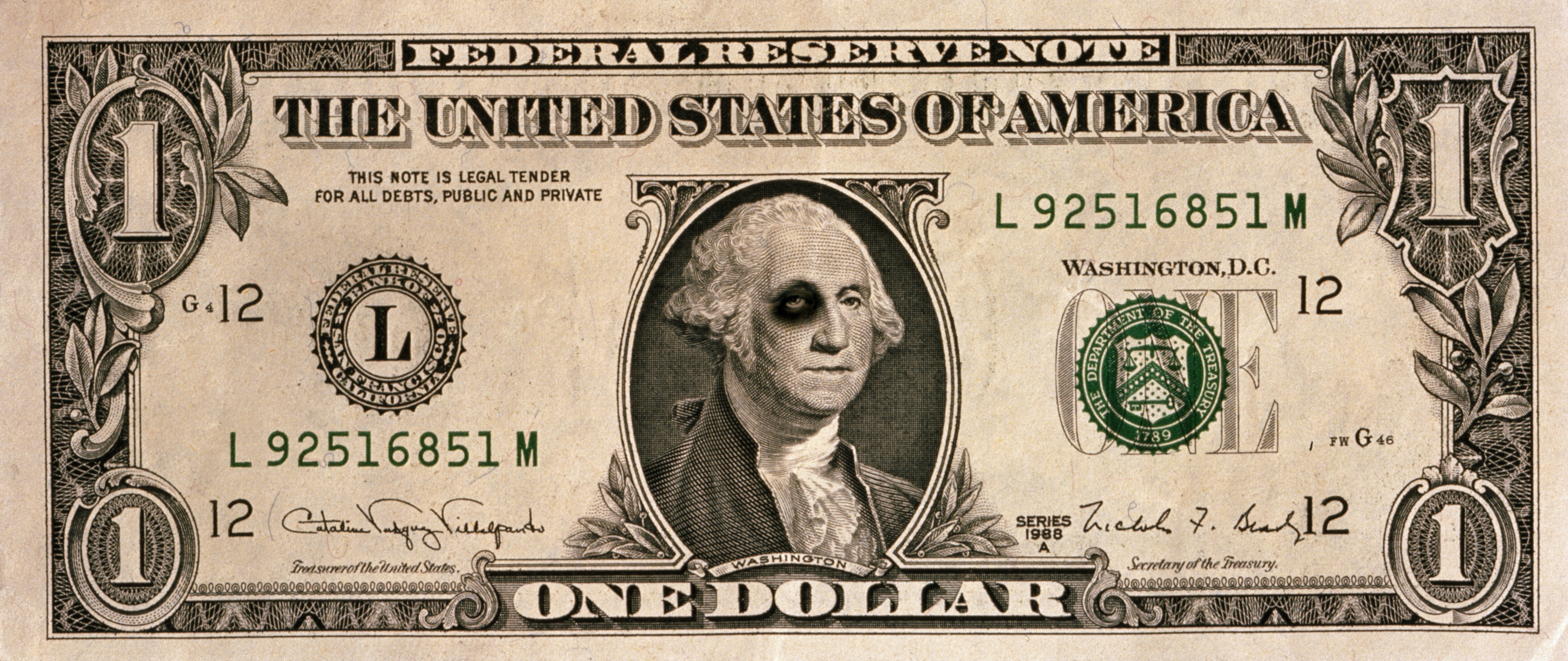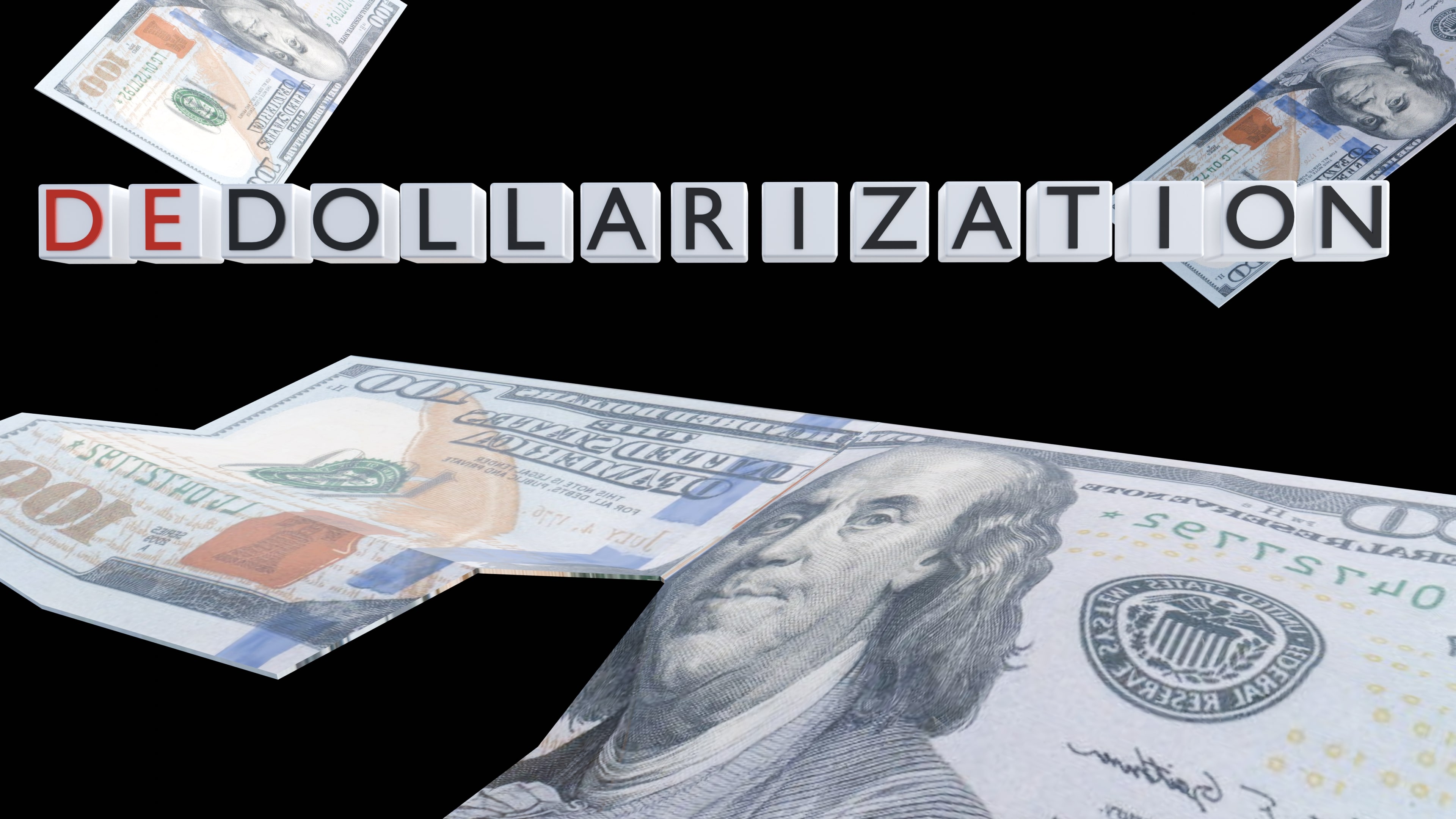The Role of the Dollar in Retirement: Is It Secure?
Protect your retirement from de-dollarization, because “capital always goes where it is treated best."


Profit and prosper with the best of Kiplinger's advice on investing, taxes, retirement, personal finance and much more. Delivered daily. Enter your email in the box and click Sign Me Up.
You are now subscribed
Your newsletter sign-up was successful
Want to add more newsletters?

Delivered daily
Kiplinger Today
Profit and prosper with the best of Kiplinger's advice on investing, taxes, retirement, personal finance and much more delivered daily. Smart money moves start here.

Sent five days a week
Kiplinger A Step Ahead
Get practical help to make better financial decisions in your everyday life, from spending to savings on top deals.

Delivered daily
Kiplinger Closing Bell
Get today's biggest financial and investing headlines delivered to your inbox every day the U.S. stock market is open.

Sent twice a week
Kiplinger Adviser Intel
Financial pros across the country share best practices and fresh tactics to preserve and grow your wealth.

Delivered weekly
Kiplinger Tax Tips
Trim your federal and state tax bills with practical tax-planning and tax-cutting strategies.

Sent twice a week
Kiplinger Retirement Tips
Your twice-a-week guide to planning and enjoying a financially secure and richly rewarding retirement

Sent bimonthly.
Kiplinger Adviser Angle
Insights for advisers, wealth managers and other financial professionals.

Sent twice a week
Kiplinger Investing Weekly
Your twice-a-week roundup of promising stocks, funds, companies and industries you should consider, ones you should avoid, and why.

Sent weekly for six weeks
Kiplinger Invest for Retirement
Your step-by-step six-part series on how to invest for retirement, from devising a successful strategy to exactly which investments to choose.
Everybody knows the importance of Social Security, regular 401(k) contributions, and good health to achieving a secure retirement. Less clear is the role the U.S. dollar plays in financial readiness for life after work.
The dollar is more than just a form of payment used by Americans to purchase gas, buy a beer or pay a credit card bill. It's one of the most reliable currencies in the world, a status that has benefited American retirees for generations.
Since the end of World War II, the U.S. dollar has been the world’s principal reserve currency, meaning it's held in large amounts by other countries to promote stability in their own economies and for use in international transactions. The dollar is the most widely used currency for global trade, according to the Council on Foreign Relations.
From just $107.88 $24.99 for Kiplinger Personal Finance
Become a smarter, better informed investor. Subscribe from just $107.88 $24.99, plus get up to 4 Special Issues

Sign up for Kiplinger’s Free Newsletters
Profit and prosper with the best of expert advice on investing, taxes, retirement, personal finance and more - straight to your e-mail.
Profit and prosper with the best of expert advice - straight to your e-mail.
The dollar in retirement: Breaking down its value
What does all that wonky currency talk have to do with people’s retirement and financial security?
Like most financial assets, the dollar rises and falls. Its price movements are based on economic conditions, the level of interest rates and inflation, and increasingly, on how global trading partners view the United States’ trustworthiness and reliability.
The value of the dollar is also a key financial data point used to determine the health and future prospects of the U.S. economy and financial markets. It's also a gauge of how other nations perceive the United States.
This year, the dollar has performed poorly, a sign that foreign investor confidence in the U.S. might be diminishing, and investors are moving some of their money out of U.S.-denominated assets to invest elsewhere. In short, the weaker dollar is signaling that the U.S. image as a great destination for investment dollars is being questioned.
The dollar and American exceptionalism
“The questions around U.S. exceptionalism and (the impact) on the dollar are a wake-up call,” said Adrian Helfert, chief investment officer, alternative and multi-asset portfolios at Westwood Group and manager of Westwood Income Opportunity Fund.
A good measuring stick is the euro, with which Americans who travel to Europe are familiar. At the start of the year, the euro/dollar was 1.0355, but the euro hit a fresh high on April 21 of 1.1574.
At the start of the year, a U.S. traveler who spent 100 euros would have paid roughly $104 in U.S. dollars. Today, a traveler spending $100 euros would need nearly $116 to pay the bill.
Goldman Sachs said in a recent research note that strong U.S. asset return prospects are responsible for the dollar’s strength. However, analysts also argued that the impact of tariffs on U.S. profit margins and consumer real incomes, due to waning belief in U.S. exceptionalism, “could crack the central pillar of the strong dollar.”
Here are three ways the dollar can impact Americans’ retirement.

1. Purchasing power
When the dollar is strong compared with other currencies, Americans can buy more with $1. When the dollar weakens, its purchasing power diminishes. This notion of getting more bang for your buck or spending less applies to both spending abroad and buying goods here in the U.S.
“The purchasing power of the dollar directly determines your standard of living,” said Helfert. Just as a 401(k) or IRA investor takes market risk and inflation risk into account, they must also consider so-called currency risk.
Let’s say you’re planning a trip to Italy this summer. If you spend 150 euros on a fish-based antipasto, polenta, pasta, salad, wine, and dessert, it will cost you $172.50 at today’s exchange rate of 1.15. A year ago, that same meal would have cost you about $161.

2. Investment returns
A primary reason that U.S. stocks and other assets have performed so well in the past two decades is that foreigners viewed the prospects for strong returns as better than those in other countries. All the capital flowing into U.S. markets boosted asset prices, making the dollar strong, as well.
“Capital always goes where it is treated best,” said Kristian Kerr, head of macro strategy for LPL Financial.
Let’s say the dollar weakens even more relative to the euro, from 1.15 to 1.30. That will likely spur investors to move money out of the U.S. and into European markets, where the currency is strengthening, Kerr says. “You’re going to see people putting money to work in international markets.”
That could create pressure on the value of an American-centric investment portfolio as money is withdrawn from the U.S. and invested elsewhere. The antidote is for investors to diversify their portfolio beyond U.S. borders, says Kerr. The good news? Foreign assets are selling at lower valuations than U.S. assets. “They’re historically very cheap."
So-called de-dollarization, or a significant reduction in the use of the dollar worldwide, would shift the “balance of power among countries, and this could reshape the global economy and markets,” according to a J.P. Morgan blog post titled “De-dollarization: Is the U.S. dollar losing its dominance?”
According to J.P. Morgan, “De-dollarization would likely lead to a broad depreciation and underperformance of U.S. financial assets vs the rest of the world.”
What de-dollarization could mean for your portfolio
Here’s how a weaker dollar could impact your U.S.-based investments. Let’s say the U.S. stock or mutual fund you own goes up 5%, but the dollar loses 5% of its value. The greenback decline essentially wipes out your stock gain.
“Currency can be a significant component of your portfolio return,” said Helfert.
While every Wall Street pro Kiplinger spoke with thinks the probability is low that the dollar will lose its status as the world’s reserve currency — due to our markets' superior liquidity (meaning investors can buy and sell assets easily), deeply developed capital markets and reputation for rule of law — there is a cost to be paid if the U.S.’s reserve currency status is called into question.
“It means increasing volatility of U.S. asset classes, it means potentially higher inflation, and it means a higher cost of capital for U.S. corporations,” said Helfert.
It also means that the so-called risk premium (i.e., the extra return an investor expects to receive for taking on a riskier investment compared with a risk-free investment, such as a U.S. Treasury note or bond) will increase. “That lowers the long-term equity returns expected in the U.S., mainly due to higher capital costs.”
3. Borrowing costs
If money moves out of U.S. assets, including government bonds, that will probably result in higher interest rates, says Komson Silapachai, partner at Sage Advisory Services.
Higher interest rates mean higher borrowing costs. But on the plus side, higher rates mean retirees can earn more on their fixed-income investments, Silapachai says.
Like all financial headlines that rattle investors, Silapachai says investors shouldn’t get too caught up in worst-case scenarios. Stick to your long-term plan.
“These headlines are certainly intense, and there is a lot of fear out there,” says Silapachai. “But, ultimately, (for) any long-term investor, including folks looking to save for retirement, sticking to that long-term is going to be the most important thing.”
Related content
Profit and prosper with the best of Kiplinger's advice on investing, taxes, retirement, personal finance and much more. Delivered daily. Enter your email in the box and click Sign Me Up.

Adam Shell is a veteran financial journalist who covers retirement, personal finance, financial markets, and Wall Street. He has written for USA Today, Investor's Business Daily and other publications.
-
 Nasdaq Leads a Rocky Risk-On Rally: Stock Market Today
Nasdaq Leads a Rocky Risk-On Rally: Stock Market TodayAnother worrying bout of late-session weakness couldn't take down the main equity indexes on Wednesday.
-
 Quiz: Do You Know How to Avoid the "Medigap Trap?"
Quiz: Do You Know How to Avoid the "Medigap Trap?"Quiz Test your basic knowledge of the "Medigap Trap" in our quick quiz.
-
 5 Top Tax-Efficient Mutual Funds for Smarter Investing
5 Top Tax-Efficient Mutual Funds for Smarter InvestingMutual funds are many things, but "tax-friendly" usually isn't one of them. These are the exceptions.
-
 Quiz: Do You Know How to Avoid the 'Medigap Trap?'
Quiz: Do You Know How to Avoid the 'Medigap Trap?'Quiz Test your basic knowledge of the "Medigap Trap" in our quick quiz.
-
 We Retired at 62 With $6.1 Million. My Wife Wants to Make Large Donations, but I Want to Travel and Buy a Lake House.
We Retired at 62 With $6.1 Million. My Wife Wants to Make Large Donations, but I Want to Travel and Buy a Lake House.We are 62 and finally retired after decades of hard work. I see the lakehouse as an investment in our happiness.
-
 Social Security Break-Even Math Is Helpful, But Don't Let It Dictate When You'll File
Social Security Break-Even Math Is Helpful, But Don't Let It Dictate When You'll FileYour Social Security break-even age tells you how long you'd need to live for delaying to pay off, but shouldn't be the sole basis for deciding when to claim.
-
 I'm a Wealth Adviser Obsessed With Mahjong: Here Are 8 Ways It Can Teach Us How to Manage Our Money
I'm a Wealth Adviser Obsessed With Mahjong: Here Are 8 Ways It Can Teach Us How to Manage Our MoneyThis increasingly popular Chinese game can teach us not only how to help manage our money but also how important it is to connect with other people.
-
 Global Uncertainty Has Investors Running Scared: This Is How Advisers Can Reassure Them
Global Uncertainty Has Investors Running Scared: This Is How Advisers Can Reassure ThemHow can advisers reassure clients nervous about their plans in an increasingly complex and rapidly changing world? This conversational framework provides the key.
-
 5 Ronald Reagan Quotes Retirees Should Live By
5 Ronald Reagan Quotes Retirees Should Live ByThe Nation's 40th President's wit and wisdom can help retirees navigate their financial and personal journey with confidence.
-
 We're 78 and Want to Use Our 2026 RMD to Treat Our Kids and Grandkids to a Vacation. How Should We Approach This?
We're 78 and Want to Use Our 2026 RMD to Treat Our Kids and Grandkids to a Vacation. How Should We Approach This?An extended family vacation can be a fun and bonding experience if planned well. Here are tips from travel experts.
-
 The 8 Stages of Retirement: An Expert Guide to Confidence, Flexibility and Fulfillment, From a Financial Planner
The 8 Stages of Retirement: An Expert Guide to Confidence, Flexibility and Fulfillment, From a Financial PlannerRetirement planning is less about hitting a "magic number" and more about an intentional journey — from understanding your relationship with money to preparing for your final legacy.